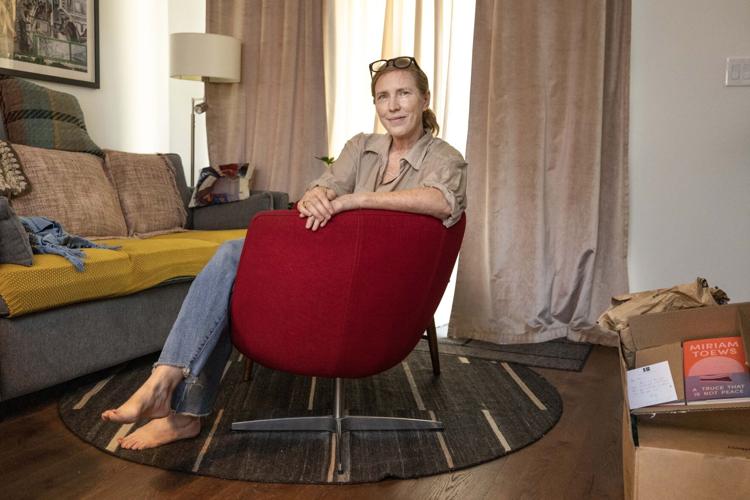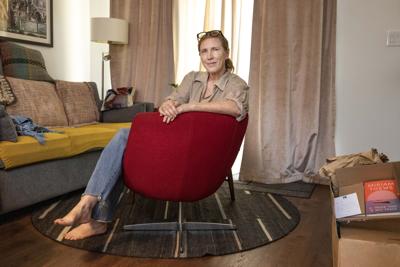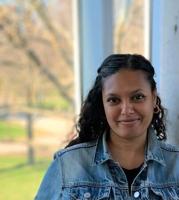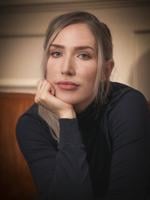Twenty-five years after “Swing Low,” her book about her fatherŌĆÖs struggles with bipolar disorder, Manitoba-born author Miriam Toews is returning to non-fiction.
While she has written in her fiction about the impact of suicide on Mennonite communities, Toews delves into these subjects from a new interrogative framework in “A Truce That Is Not Peace” (Knopf Canada).
It looks at the relationship between memory and futurity, and how this uneasy ŌĆ£truceŌĆØ can create problems for oneŌĆÖs sense of reality. Her early days as a divorcee, the caprices of readers, and the vows of silence her late father and sister adopted in the face of mental health struggles are explored with the unassuming wisdom that readers have come to expect from ToewsŌĆÖ work.
ŌĆ£My sister punctuated her life with long periods of silence,ŌĆØ Toews writes. ŌĆ£It was during these periods that she begged me to write her letters ŌĆö about anything, my life, the days ŌĆö and in that asking was an offering. She taught me how to stay alive. Silence and words: both are good, both are failures, both are efforts, and in that effort is where life lies.ŌĆØ
An subject that Toews often returns to at the behest of a Mexico City writing summit ŌĆö an invitation that is ironically rescinded when her investigations are deemed to be wanting ŌĆö is the question ŌĆ£Is writing life?ŌĆØ
ŌĆ£Is it murderous?ŌĆØ Toews muses. ŌĆ£A crime? Robbery? A kidnapping? An alternative narrative? An alternative narrative to what? Is it both death and survival? An erasure? Is suicide both death and survival? Is writing a type of suicide? Is silence the reasonable alternative to the alternative of narrative? Which is a crime, which a failure? And what happens next?ŌĆØ
Staying inspired to take up the pen during moments of trauma cannot always afford writers a means of personal salvation, but “Truce” suggests that probing a subjectŌĆÖs hidden origins, no matter how painful, can never be in vain.
I spoke with Toews on the eve of her ║ŻĮŪ╔ńŪ°╣┘═°book launch┬Ā to discuss the spiritual companionship of other writers and whether the failure of language is humanity’s greatest form of creative expression.┬Ā
The title of the book comes from a quote by American poet Christian Wiman. You cite your influences quite liberally in “Truce,” which include passages from Robert Walser, Sam Savage, Juan Villoro and your friends. Why was it important for you to acknowledge this lineage?
The book is about writing and I wanted to create a kind of community for myself in the writing process, like populating my mind with a basketball team bench. Writing is such a lonely, solitary task that itŌĆÖs reassuring to imagine yourself cerebrally with other writers.
You quietly retired from writing after the release of “Fight Night.” It was largely a decision based on wanting to help raise your grandchildren, but you also describe an incident that occurred while visiting an English class where a student criticized a writer of your stature having had, in their words, a ŌĆ£platformŌĆØ long enough. Can you talk about the realization that you had more to say?
Maybe not ŌĆ£retirement,ŌĆØ but I was obsessed with the idea of not writing. “Truce” was kind of an argument with myself, like building a wall and knocking it down at the same time. At the end of every book I write, I tell myself that I don’t think I can ever do this again and endure what it takes out of me. But time passes and I recover. IŌĆÖm not trying to be cute or anything. IŌĆÖm self-conscious about my writing. IŌĆÖm embarrassed about it and thereŌĆÖs a profound mortification that accompanies it, but IŌĆÖm aware enough that regardless of the reason why I do it, I need to do it ŌĆö to stay sane and to stay alive, not to be too dramatic.
IŌĆÖm curious if the decision to return to non-fiction was because the form offered you something that novels could not, or if, with as large of a back list as you have, the text is meant to qualify how readers should understand your fiction?

A Truce That Is Not Peace, Miriam Toews, Knopf Canada, 192 pages, $34
Knopf CanadaThe book will probably clarify some things, but itŌĆÖs not why I chose the non-fiction structure. I was just really missing my sister and trying to understand why she killed herself. How did this happen? What could I have done? I asked myself all of the things that so-called suicide survivors think about. ItŌĆÖs not healthy and you need to move on, but you canŌĆÖt help how these questions come at you. I wanted to attempt an understanding of my sisterŌĆÖs struggles with futility. I wanted to be closer to her, to meet her in the text so to speak. In order to do those things, I felt that I had to write non-fiction: about my life and her life and our familyŌĆÖs lives.
You write in the book that silence ŌĆö not just your sisterŌĆÖs silence, but your own when you decided to stop writing ŌĆö is ŌĆØa misdirection of the unspeakableŌĆØ and a ŌĆ£way of holding on.ŌĆØ Could you explain how this paradox became a way of building your life around the creative act of writing?
It was a big realization, the misdirection part especially. Language is what we have with each other; itŌĆÖs our medium. Ultimately, when you finish writing a book, the limitations of language show that a book can only be an attempt or failure at capturing something. But silence is a conscious, deliberate creative act of misdirection, certainly with regards to my father and sisterŌĆÖs extended periods of silence. Maybe it was a withholding too, but it also was saying something profound, more than anything I could ever write. In a way, it doesnŌĆÖt matter what I say ŌĆö itŌĆÖs not quite what I mean. I cannot convey with words what I am experiencing: the psychic or physical pain or the joy IŌĆÖm experiencing. When I do, itŌĆÖs misunderstood.
You question whether thoughts of suicide are brought on by the pain of anticipating the end of life or the world, which can become unbearable. With your disclosure in the book of a vulnerable moment in your life that occurred on the banks of WinnipegŌĆÖs Assiniboine River, was it important for you that “Truce” show that there is an alternative to this anticipation of the end?
If you’re asking me if it was important to say ŌĆ£Look, you don’t have to kill yourself, there are alternatives,ŌĆØ I would say that I donŌĆÖt have the answers. But coming to an awareness that IŌĆÖm just not going to know the end and canŌĆÖt anticipate it? Then yes. I had to realize that I would have to live with not knowing the reasons for my sister and fatherŌĆÖs suicides, for example. What was necessary for me was to get to a place where I could respect their choice to end their lives.
“Truce” and “Swing Low” are about the realization that if I could get to that place of respect, then I would be able to understand how I could not make that same decision.
I especially liked the travelogue moments in the book: the letters to your sister when you were 18 about your relationship with your ex-boyfriend, Wolfie. The correspondence is about carving a space for yourself as much as it is about your suspicion of the literary world you were immersed in. How important was it for you when you began your literary career to define yourself against a certain notion of what constituted literature?
The idea of being a writer never occurred to me until my sister asked that we exchange letters as a kind of pact. She promised to stay alive if I wrote to her. Of course, the idea of a pact is a ridiculous, unrealistic thing. My letters arenŌĆÖt going to keep somebody alive! But we were young and that was the first time that I wrote about my life, my adventures and my feelings with a sense of urgency.
BlackwellŌĆÖs (the Oxford book seller) and Oxford were very intimidating because I was female and from a small Mennonite conservative community where writing was not encouraged generally. With my first novel, a guy on the radio asked ŌĆ£Is this really a novel? This small, dirty, domestic, woe-is-me, mothers-on-welfare story?ŌĆØ My sister had my back and wrote to this guy saying ŌĆ£Yeah, motherf—ker, itŌĆÖs a novel!ŌĆØ
That world still exists and makes me feel like an impostor existing on the fringes, but also thatŌĆÖs how this Mennonite community upbringing ŌĆ£thingŌĆØ works. I left so long ago and yet I still feel that no one will want to read my writing. I tell myself that maybe IŌĆÖll make a connection with others and feel less alone in the world. Or I’ll convince myself that I should just be retired, sitting quietly in a chair with my grandkids running around me. But of course, you can be both those things: you can write books and be a grandmother at the same time.
You write about understanding ŌĆ£narrative as something to be avoidedŌĆØ and how embracing writing must engage with the fact that ŌĆ£writing will always fail to do the thing it sets out to do, which is to tell the truth.ŌĆØ I know that you are quite fond of the ŌĆ£Plotless FictionŌĆØ section at independent bookstore Type Books and I was hoping you could talk a bit about why that fiction appeals to you.
I love to read books that are character-driven. When the character is the main event, I think that the plot has to fall away or not even exist in the first place. A book about a grief-stricken woman wandering around a strange city and jotting down observations is my favourite thing to read about in the world. I make a beeline to that ŌĆ£Plotless FictionŌĆØ shelf, and whether itŌĆÖs Paula Fox, Renata Adler or Natalia Ginzburg, that is the kind of fiction IŌĆÖm drawn to: the hybrid stuff. All these labels and distinctions about whether it’s fiction or creative non-fiction or genre fiction sort of melt away in the books I love. ItŌĆÖs just writing, one soul to another.
This interview has been edited and condensed.
































To join the conversation set a first and last name in your user profile.
Sign in or register for free to join the Conversation